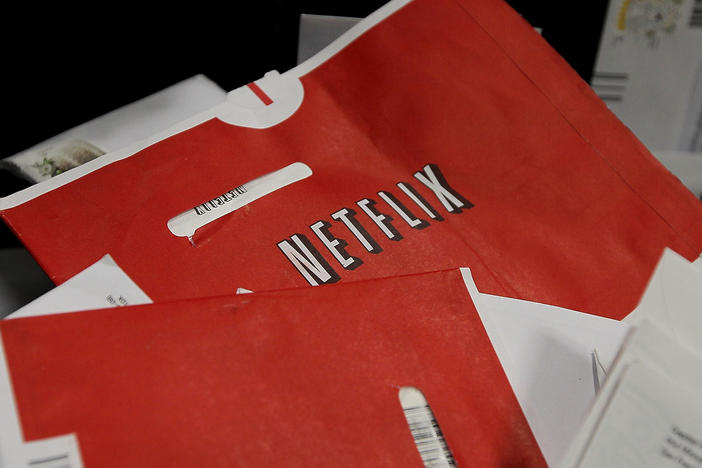Section Branding
Header Content
Hollywood crews vote to authorize a strike for better pay and working conditions
Primary Content
Behind-the-scenes crew members say they're working long days without breaks for dismal pay. Union leadership may now call a strike.
Transcript
STEVE INSKEEP, HOST:
The pandemic prompted many people to ask if they really want to return to the same work routine that lockdowns disrupted. And that is the backdrop of a threatened strike among people who work in film and TV production. Union members from the International Alliance of Theatrical Stage Employees, or IATSE, voted to authorize a strike if necessary. Here's NPR's Mandalit del Barco.
MANDALIT DEL BARCO, BYLINE: The union IATSE represents 60,000 film and TV production workers, everyone from cinematographers and editors to makeup artists to the workers who feed the casts and crews. Nearly all of them - 98% - voted to authorize a strike if the producers don't agree to give them better work schedules, pay and work conditions. For months, the union has been trying to hammer out an agreement with the Alliance of Motion Picture and Television Producers, or the AMPTP. The threat of an actual strike could be leverage when the two sides sit down again for talks as soon as today.
REBECCA RHINE: If we have to go on strike, it will be devastating to everybody. But what our members are telling us is if that's what's necessary, that's what they'll do.
DEL BARCO: Rebecca Rhine is the national executive director of the International Cinematographers Guild, which represents 9,000 camera crew workers and publicists, most of them in Hollywood. Rhine says IATSE's strike threat is a clear mandate.
RHINE: It's a message to the employers that they need to listen to what the people who work for them are saying they need to have a healthy and a sane workplace.
DEL BARCO: Rhine says workers often complain of sleep deprivation from the long, grueling production hours they endure with few breaks. Some say they can't live on wages paying less than $18 an hour. Others want increased compensation for working on productions that appear on streaming services. They're currently paid less under an agreement signed in 2009, when streaming was still new.
BEN GOTTLIEB: A lot of people are told that they have to choose between the industry and having a family. It's brutal.
DEL BARCO: Ben Gottlieb is a lighting technician who helps run an Instagram account for film and TV production workers to share their experiences.
GOTTLIEB: People are frustrated that it's an iconic, prolific American industry that sort of thrives on these, like, almost archaic work practices.
DEL BARCO: Now the union's calls for change are getting support from legislators and celebrities, such as Joseph Gordon-Levitt, Mindy Kaling and Kerry Washington. For its part, the producers alliance says it wants to reach an agreement to keep the industry working. Jarryd Gonzales, a former California Republican strategist, is the spokesman for the AMPTP. He reads from the group's latest statement.
(SOUNDBITE OF ARCHIVED RECORDING)
JARRYD GONZALES: We deeply value our IATSE crew members and are committed to working with them to avoid shutting down the industry at such a pivotal time, particularly since the industry is still recovering from the economic fallout from the COVID-19 pandemic.
DEL BARCO: Rebecca Rhine from Local 600 says for a few months during the pandemic, producers offered paid sick leave, shortened production days and gave workers breaks. But she says with production back to pre-pandemic levels, things have gone backwards.
RHINE: If you would say to me that we would be fighting for breaks and weekends in the year 2021, I wouldn't believe it. But that's really where we are. What the pandemic really taught people was that the industry could, if they chose to, change the way they do business and put people's health and safety first.
DEL BARCO: If the Hollywood crews do strike, it would be for the first time in the union's 128-year history.
Mandalit del Barco, NPR News, Los Angeles.
(SOUNDBITE OF FRAMEWORKS' "DELPHINA") Transcript provided by NPR, Copyright NPR.
Bottom Content



